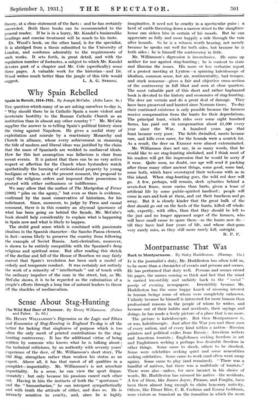Sense About Stag-Hunting
MR. HENRY WILLIAMSON'S Digression on the Logic and Ethics and Economics of Stag-Hunting in England To-day is all the better for lacking that singleness of purpose which is too often the only merit of printed contributions to the stag- hunting controversy. It has the additional virtue of being written by someone who knows what he is talking about ; the technical criticisms, by an authority with seventy years' experience of the deer, of Mr. Williamson's short story, The Old Stag, strengthen rather than weaken his status as an expert. Above all, it has that rarest of all qualities in a pamphlet—impartiality. Mr. Williamson's is not armchair impartiality. In a sense, he can view the sport dispas- sionately ; but only because his passions cancel each other out. Having in him the instincts of both the " sportsman " and the " humanitarian," he can interpret sympathetically and with truth the attitude of either, and does so. He is intellszly sensitive to cruelty, and, since he is highly
imaginative, it need not be cruelty in a spectacular guise ; a herd of cattle thrusting down a narrow street to the slaughter- house can sicken him in certain of his moods. But he can appreciate as fully and more happily a ride through the rain after hounds. So he is a witness worth hearing, not merely because he speaks out well for both sides, but because he is both sides : he is himself the controversy in little.
Mr. Williamson's digression is inconclusive. He sums up neither for nor against stag-hunting ; he is content to state and illumine the issues. His more or less verbatim report of a protest meeting at Lynton—a spinning kaleidoscope of idealism, common sense, hot air, sentimentality, bad temper, and stark nonsense—gives a fair and objective cross-section of the controversy in full blast and seen at close quarters. The most valuable part of this short and rather haphazard book is devoted to the history and economics of stag-hunting. The deer are vermin and do a great deal of damage. They have been preserved and hunted since Norman times. To-day their continued existence is only possible because the farmers receive compensation from the hunts for their depredations. The principal hunt, which rides over some eight hundred farms, has paid out in compensation about £1,500 every year since the War. A hundred years ago that hunt became very poor. The fields dwindled, meets became rare, and kills even rarer, for the hounds were a scratch lot. As a result, the deer on Exmoor were almost exterminated.
Mr. Williamson does not say, in so many words, that he would like to see stag-hunting abolished, and I think most of his readers will get the impression that he would be sorry if it were. Quite soon, no doubt, our age will send it packing after those many other ancient things, some good, some bad, some both, which have overstayed their welcome with us in this island. When stag-hunting goes, the wild red deer will go. A few, perhaps, will remain, sleek sybarites behind a seven-foot fence, more curios than harts, given a lease of artificial life by some public-spirited landlord ; people will come in cars and look at them, and eat their luncheon and go away. But it is clearly kinder that the great bulk of the deer should go out on the heels of the hunts, killed off whole- sale, expertly, with rifles, than that they should be left to the just and no longer appeased anger of the farmers, who will have small cause to spare them—as the hunts now do— till they have had four years of life, and whose shot-guns very rarely miss, as they still more rarely kill, outright.
R. P. F.






























 Previous page
Previous page